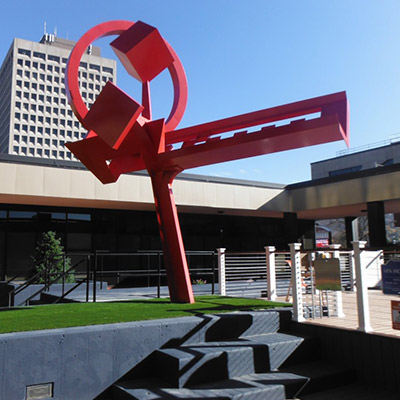Reviewed by Lee Shepherd
The Brentano and Borromeo, the Juilliard, the Kronos, the New Zealand, the Ying and many others – I’ve heard some world-class string quartets in my day — but none of them can hold a candle to the Aron Quartett of Vienna, and last Sunday’s concert.
The foursome’s utterly clean, crisp, no-nonsense performance channeled the exuberance and genius of Haydn, Schubert and Korngold directly to the listener, without intermediaries. Focused and intense as a laser pointer dot, yet relaxed and smiling, they made some incredibly difficult music look effortless.
The program was the last chamber concert of the season sponsored by the Binghamton Philharmonic in the acoustically perfect Chamber Hall of the Anderson Center for the Arts on the Binghamton campus.
Their music is not so much to be heard as to be surrendered to. Take their rendition of the “String Quartet in F Major, Op. 77, No. 2” by Haydn. As Goethe wrote in 1790, “One hears four intelligent people in conversation and has the impression that one has gained something from the discourse.” Spot on.The Aron played the quartet with charm and great joy.
The Korngold “String Quartet No. 3 in D Major, Op. 34” was the wild card on the program. Known for his award-winning 1930s movie scores, the Austrian composer’s music falls between the cracks of the concert hall and the music theater. You could vividly visualize scenes as you listened — a chase through the park, a spirited folk dance, children at play, despair and desolation felt from the loss of a loved one. You couldn’t hear this work as played by the Aron Quartett without wanting to learn more about the composer and listen to more Korngold compositions.
And then the piece de resistance of the program: Schubert’s “Death and the Maiden” Quartet (D minor, D. 810). Written four years before he died and during the early onset of syphilis-induced manic-depression, Schubert’s pain and impending loss sharpened the joy that fills the quartet. The second movement, taken from a song that gives the quartet its name, showcased the virtuosity of each musician: violinists Ludwig Mueller and Barna Kobori, violist Georg Hamann and cellist Christophe Pantillon. The last movement, an Italian Saltarello, ended with the fastest playing you’ll ever hear in string quartet music – tossed off by the Aron Quartett as a wild horse race to the finish.
In contrast to the restraint of the performers, the audience broke into loud applause, jumped to a standing ovation and shouted “Wunderbar” and “Bravo.” They Aron Quartett rewarded everyone with an exquisite encore: the slow movement of Haydn’s “Kaiser” quartet. Once the German national anthem, the beautiful tune was played prayerfully.




































